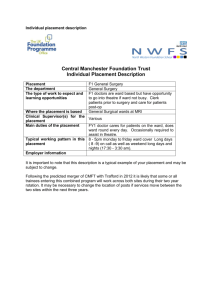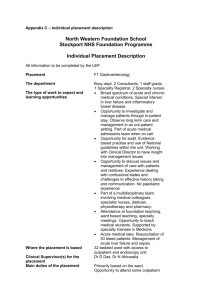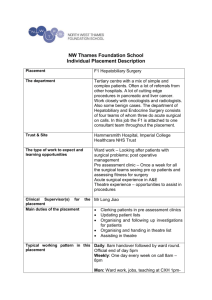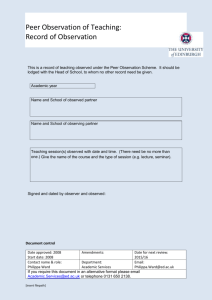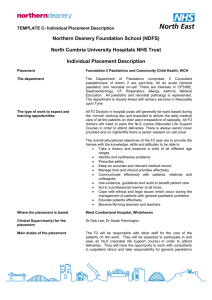Nursing 2 - University of Edinburgh
advertisement
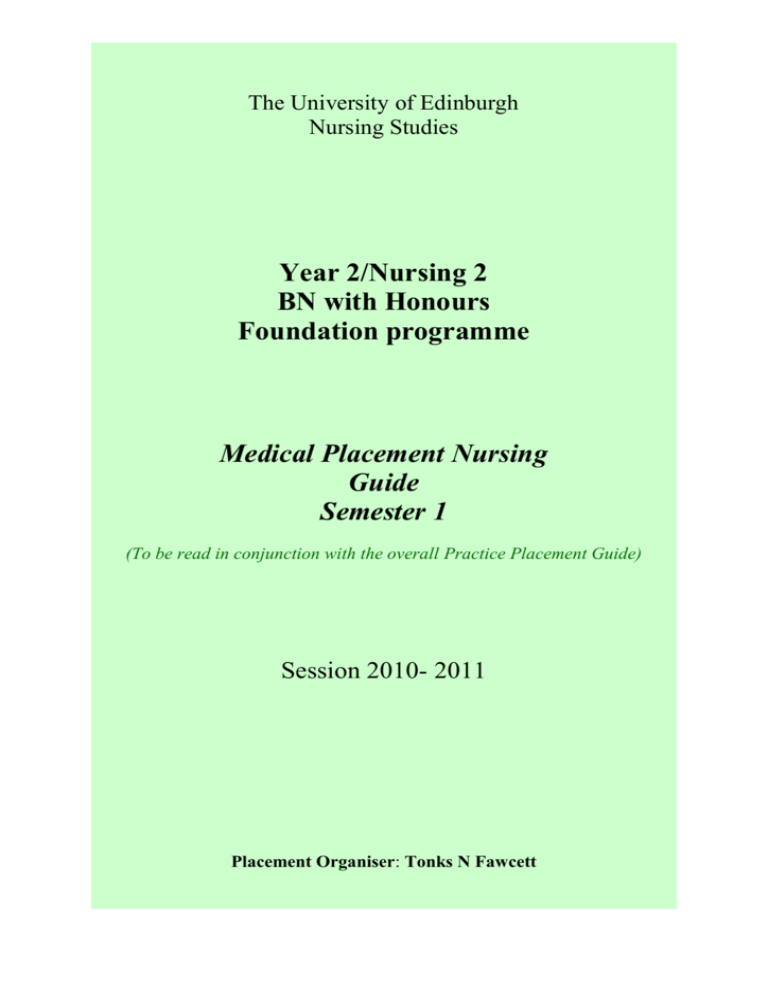
The University of Edinburgh Nursing Studies Year 2/Nursing 2 BN with Honours Foundation programme Medical Placement Nursing Guide Semester 1 (To be read in conjunction with the overall Practice Placement Guide) Session 2010- 2011 Placement Organiser: Tonks N Fawcett Tonks N Fawcett September 2010 Contents Page Course Outline Introduction……………………………………………………… 3 Specific Aims……………………………………………………… 3 Learning Outcomes……………………………………………….. 3 Mentor…………………………………………………………….. 4 Keeping a reflective Diary…………….…………………………. 4 Assessment of learning outcomes…………………………………. 4 Absence due to sickness of special circumstances……………….... 5 Uniform Jewellery and Swipe cards…………………………. …… 5 Placement Evaluation and Audit…………… ……………………… 5 Useful contacts……………………………………………………... 5 Manual Handling……………………………………………………. 5 Accidents and Incidents………………………………………………6 Information Sheet for mentors………………………. . …………… 6 Location of Placements……………………………………………… 7 Letter to the Placement areas………………………………………….8 2 Tonks N Fawcett September 2010 The University of Edinburgh Nursing Studies NURSING 2 Session 2010-11 ~~~~~~~~~~~~ Foundation Programme N.B. This should be read in conjunction with the overall ‘Practice Placement Guide’ on Web CT. Medical Nursing Care Semester 1 Wednesdays 7.30 -3.30 and Fridays 7.30 -1pm Week 1-10, 2010 (Group 2009-13) Placement Organiser: Tonks N Fawcett Students will be based on medical wards for two days each week during semester 1. Wednesday and Friday (Weeks 1-10) are reserved for this clinical experience. Following closely from the experience and learning outcomes achieved in the students’ first placement in year 1 of the programme, the students will be placed in the same adult ward setting (unless there are particular circumstances). Each week, a specific clinical learning focus will have been identified for the placement days. This focus will relate to the lectures, tutorial and skills sessions in the same week. The students’ liaison lecturers will ensure an optimal environment and that the mentors are fully familiarised with the placement learning objectives and assessment documentation. The clinical process objectives are found on p18 of the Foundation Clinical Assessment booklet. Clinical skills acquisition continue to be recorded in the Skills booklet and signed as achieved by the mentor. Students must have achieved a satisfactory performance in this clinical placement, alongside satisfactory academic performance to progress. Specific Aims The placement experience aims to: build on the knowledge and experiential skills gained in the first year Summer medical placement. Develop further the key concepts, knowledge and skills in relation to the patients’ experiences of medical nursing care. develop the therapeutic nature of nursing and the care interventions explore issues in nursing adults that emerge from both the formal teaching and experiential learning. Learning outcomes From this placement experience students should be able to: Build the concepts, knowledge and skills developed in first year’s learning outcomes with respect to both physical and psychological well being of the patients and families. demonstrate the integration of theoretical and practice-centred learning demonstrate safe, effective, evidence-based and responsive practice. demonstrate the principles of ethical and accountable practice demonstrate further development in critical thinking, problem solving and reflective practice in relation to medical nursing. 3 Tonks N Fawcett September 2010 Mentor Students will, ideally continue to have the mentor and co-mentor allocated to them in the summer who, in liaison with the relevant Nursing Studies staff, acting as liaison lecturers, will guide and support the students in the ongoing acquisition of the necessary clinical and interpersonal skills required in this nursing context. However, if it is not possible to have the same mentor or co-mentor, another mentor and co mentor will be allocated. A record of the mentors’ names is maintained by the Placement Organiser and in the UG (HLSP) files Keeping a Reflective Clinical Diary Keeping a reflective clinical diary is intended to provide students with an opportunity to record and reflect on their experiences on the wards. It is not expected that the diaries will be written up after every duty, but they should be kept on a regular basis such that they effectively chart the student’s progress by enabling them to: 1. ‘Log’ their developing skills and expertise in relation to the clinical objectives. 2. Comment on various impressions gained on the ward, for example: The documentation of care; The ward as a learning environment; Interdisciplinary communication 3. Identify their particular strengths and weaknesses and/or specific concerns. 4. The diaries have proved most useful in enabling supporting teaching staff to: appreciate more fully the overall ward experience facilitate the learning opportunities highlight relevant areas for further explanation/discussion. A further use of the diary would be to enable the student to record information which would be relevant to your learning objectives, care planning and course papers. Assessment of learning outcomes for the placement All students are required to achieve a satisfactory assessment of their clinical placement. Students should see that time is spent ensuring that both specific process objectives and the learning outcomes being worked towards are understood. These should be discussed with your mentor early in the placement. It is important to remember that students are working towards achieving the learning outcomes to progress to the Adult branch programme. At the end of the placement, the mentor completes the assessment booklet which relates to the specific learning outcomes which looks to reflect the sum of their impressions of the studnets’ abilities and how these have developed over the period of the placement. There will normally be an informal half way verbal assessment. By the end of Semester 1, level 3 should have been achieved in 80% of the learning outcomes (See Foundation Clinical Assessment booklet p2). Any difficulties should be discussed with the mentor as they arise so that help in overcoming them can be given. The Placement Organiser and Liaison lecturer concerned will be ready to assist with any areas of concern or difficulty. Please consult the Practice Placement Guide for details. 4 Tonks N Fawcett September 2010 Absence due to sickness or special circumstances Absence from the clinical placement due to ill health must be monitored to ensure the learning experience is not jeopardised. The student’s mentor will account for any sickness/absence in the assessment booklet, but students must let the ward staff know of any absence and also inform the Nursing Studies’ secretarial staff so that an accurate ongoing record can be maintained. All sick days have to be made up before completion of the course, in order that the requirements for registration are met. Uniform, Jewellery and Swipe cards Nursing Studies’ students are representing not only the nursing profession but also Nursing Studies and the University of Edinburgh. Students should make themselves familiar with the Lothian University Hospitals Division (LUHD) uniform policy document which is located in each practice placement setting. Uniform guidelines must be followed. No jewellery should be worn except a wedding ring (if worn) and small gold studs if ears are pierced. Hair and footwear should be appropriately professional and adhere to the LUHD uniform policy Any queries about uniform should be referred to me as Placement Organiser, and I will negotiate with the superintendent of the Sewing Room. Please consult the Practice Placement Guide for details. Swipe cards and fob keys, for those placed in the RIE, can be obtained from Reception in the General office of the School of Heath in Social Science. Evaluation and Audit At the end of the placement, both mentors and students are asked to complete an evaluation form for the placement as a learning experience and are returned to the placement organiser. These are also required for the annual audit carried out the NMC Useful Contact numbers Tonks Fawcett General Office Reception General Office University Security 0131 650 3883 (Home 0131 346 7176) Mobile; 07752 120 002 0131 650 3889 0131 651 3969 0131 650 2257 The email addresses of all the liaison lecturers will be made available to their mentees. Placement Areas The Royal Infirmary Western General Hospital Royal Victoria Hospital St John’s Hospital Roodlands Hospital 0131 536 1000 0131 537 1000 0131 537 5000 01506 523 000 0131 536 8300 5 Tonks N Fawcett September 2010 Manual Handling All students have attended the manual handling course prior to the summer placement to ensure safe and effective care for both the patient and the nurse assisting the patient. The next Manual handling course/update is early in Semester 2, 9-12 midday or 1-4p.m. Wednesday 26th January 2011. Please contact Marilyn Shiells should you have any manual handling queries. <Marilyn.Shiells@luht.scot.nhs.uk> Accidents/Incidents to Staff Appropriate first aid measures should be taken Complete an accident/incident form Medical advice from either Accident or Emergency Department, or Occupational Health should be taken, if appropriate Students should report any identified/potential Health & Safety hazards to the ward staff and, if necessary, to either the students' health and safety representative within Nursing Studies and/or the placement organiser. Please consult the Practice Placement Guide for detail Medical Placement – Foundation Programme Information Sheet for Mentors The student/s who were with you for their 4 week summer placement now return to be on the ward for a core shift each Wednesday, and 7.30 – 1p.m on Friday of the Autumn teaching semester. Each week (1-10) the students are given a particular clinical focus which links with the lectures, ‘skills sessions’ and tutorial component in the same week. It is hoped that the student will have the opportunity to concentrate on these areas each week. However, it is fully appreciated that in some weeks the specific focus may not be quite so relevant to your particular area of care and it is hoped that this can be adapted in negotiation with the student. Semester 1 (Autumn 2010) Wednesdays and Fridays Week 1 22nd & 24th September 2010 Nutritional Wellbeing in hospital Week 2 29th Sept, & 1stOctober 2010 Bowel elimination: problems and care Week 3 6th & 8th October 2010 Maintenance and monitoring of fluid and electrolyte balance Week 4 13th &15th October 2010 The vulnerable patient Week 5 20th & 22nd October 2010 Patients with problems with mobility Week 6 27th& 29th October 2010 Mechanical mobility aids on the ward Week 7 3rd & 5th November 2010 Infection control on the ward Week 8 10th & 12th November 2010 Diagnostic procedures on the ward Week 9 17th & 19th November 2010 Gender issues on the ward Week 10 24th & 26th November 2010 The safe administration of medicines 6 Tonks N Fawcett September 2010 Nursing 2 Session 2010-11 Group 2009-13 Medical Placements Semester 1 Wednesdays & Fridays Week 1-10 Nursing 2 Medical Placement Semester 1 Session 201011 Name ALLAN Rosalind ANDERSON Natalie BARKER Ruth BERUBE Erika BLACK Polly BOWEN Melissa BRIGGS Laura BROWN Anna BURNS Megan COWSILL Deborah Liberton Hospital - Ward 5 Liaison Lecturer MC Western General Hospital - Ward 2 Astley Ainslie Hospital - Mears Ward Astley Ainslie Hospital - Sutherland Ward Liberton Hospital - Ward 6 Royal Infirmary of Edinburgh - Respiratory Medicin Royal Infirmary of Edinburgh - Ward 207 Royal Victoria Hospital - Ward 5 Western General Hospital - Acute Receiv Assess Uni TF MC MC MC TF JT MC JT Royal Victoria Hospital - Ward 8 MC CRAIG St John's Hospital - Ward 4 Stroke Rehab Unit ShR St John's Hospital - Ward 21 Western General Hospital AR AU Western General Hospital - Ward 15 (Rheumatology) Western General Hospital - Ward 31 ShR JT TF JT Western General Hospital - Ward 54 Astley Ainslie Hospital - Mears Ward Astley Ainslie Hospital - Mears Ward Liberton Hospital - Ward 5 Royal Infirmary of Edinburgh - Ward 206 Renal Unit Royal Infirmary of Edinburgh - Respiratory Medicin Royal Victoria Hospital - Ward 5 Royal Victoria Hospital - Ward 8 Roodlands hospital Medical ward St John's Hospital - Ward 25 St John's Hospital - Ward 21 St John's Hospital - Ward 4 Stroke Rehab Unit Western General Hospital - Ward 50 Western General Hospital - Acute Receiv Assess Uni TF MC MC MC JT TF MC MC JT ShR ShR ShR ShR JT Western General Hospital - Ward 15 (Rheumatology) Western General Hospital - Ward 31 TF JT Western General Hospital - Ward 42 & 43 St John's Hospital - Ward 21 TF ShR Alison HALDANE Anna HALIDAY Robyn HETTLE Ruth HINDS Sophie HOWATSON Louise JOHNSON Kirsty KIM Yea-Eun KOTYRBA Lara LEITH Fiona LLOYD Adam LOUGH Stacey MAZZA Maria McDowell Amanda ORR Roslyn PIKE Rebecca QUIGLEY Annie TAYLOR Mark TRIBE Nicole WALKER Rebecca WILKES Isabella WILKINSON Heather YOUNGE Sarah 7 Tonks N Fawcett September 2010 1st September 2010 NURSING STUDIES Sister/ Charge Nurse Address The University of Edinburgh The Medical School Teviot Place Edinburgh EH8 9AG Fax 0131 650 3891 Dear Sister/Charge Nurse E-mail : T.Fawcett@ed.ac.uk BN with Honours Second year Medical Ward placement: Wednesdays and Fridays - Semester 1, September –December 2010 Group 2009-13 or direct dial 0131 650 3883 Telephone 0131 650 3887 As you will remember, ……………………………………………………………………….. was/were with you for their 4-week medical placement during the summer vacation. They now return to your ward every Wednesday for a core early shift and Friday 7.30 – 1pm in Semester 1 of their second academic year. Ideally it would be valued if they could have the same mentor and co-mentor but I know this is not always possible. Their placement days begin on Wednesday 22nd September 2010 and finishes on Friday 26th November 2010. Attached is a sheet which explains the clinical focus of each week’s two days which links with the lecture, tutorial and skills content for that week Essentially, however, the students are following their Foundation programme learning outcomes towards completion in April 2011. The liaison lecturer for the students on your ward will be………………………… who will visit the student/s on during this period. Do contact me anytime should you have any queries. Best wishes, Tonks N Fawcett Senior Lecturer/Course Organiser Enc 8

